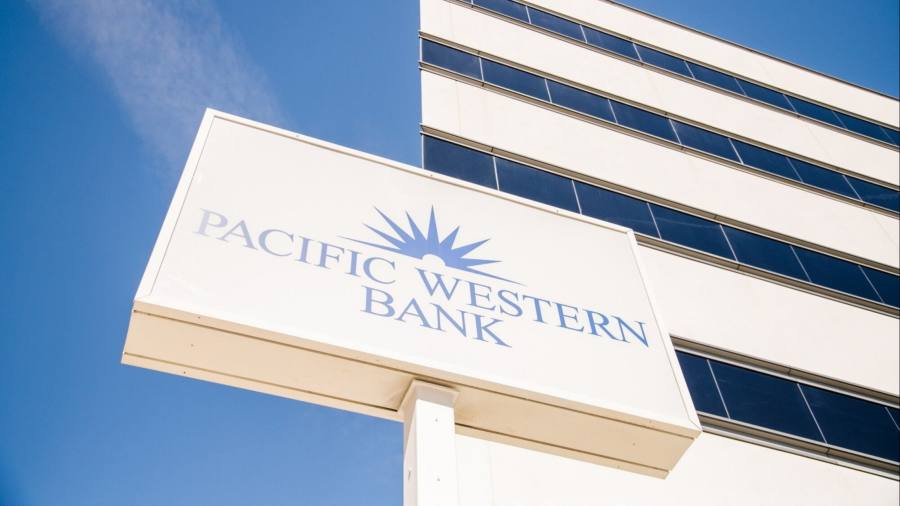Receive free US banks updates
We’ll send you a myFT Daily Digest email rounding up the latest US banks news every morning.
Terry Peterson, the chief executive of regional bank Pacific West, was close to signing a lease for a new branch in early May when the landlord ghosted him.
It took a few weeks and a lot of media reports before Peterson realised why his phone calls were not being returned: Jitters from the regional financial crisis that had started in mid-March with the failure of Silicon Valley Bank had hit confidence in other banks, including California-based Pacific Western, whose shares fell.
He called the landlord and explained that there had been a misunderstanding. “I told him: ‘We’re not that PacWest.’”
SVB’s failure in March raised questions about the solvency of more than a dozen banks that were facing similar investment losses and also had a large percentage of uninsured deposits. But for some financially sound regional lenders with names that sounded the same — of which there are a surprising amount — the problems at SVB and other banks have created a crisis of confusion.
Pacific West is a typical regional lender with four branches based in Portland, Oregon. In May, it added a disclaimer in 42-point text to its website’s homepage explaining that it has no relationship to Pacific Western bank, commonly known as PacWest, based in Beverly Hills, California, which has a division that, like SVB, specialises in lending to start-ups and their investors. In the wake of SVB’s failure, depositors fled that PacWest, causing its shares to drop more than 60 per cent this year.
“We understand that there may be some confusion due to the similarity between our names, but we want to assure you that our bank is financially stable and operating normally,” reads the statement on Pacific West’s website.
Pacific West’s predicament is not unusual. There are two dozen banks in the US with Pacific in their name, including Pacific National Bank, which is based in Miami, a city that is on the coast of the Atlantic Ocean. There are also 56 banks with either west or western in their names, including First Western Bank based in Booneville, Arkansas, a city in the south-east of the US.
Signature Bank, which failed in March, also had a name that was not all that signature. There are four lenders with that name in the US, not including the one that was formerly based in New York City and involved in processing crypto transactions and lending to real estate developers.
When that Signature collapsed, Rob Shamy, who heads a different Signature Bank based in Toledo, Ohio, had to reassure customers that his company was not in trouble and had no ties or similarities to the New York lender, beyond its name. “What are the odds with the same name and so forth?” Shamy told a local media outlet at the time.
Pretty good, it turns out. Gina Bleedorn, who is a co-founder of Adrenaline, a branding group that specialises in financial services, said there were a surprising number of banks that had the same name. There are, for instance, more than 230 banks in the US named First National Bank. The practice is so common there is a term for it — symbolic isomorphism — coined by two management professors in the early 2000s.
“Bank CEOs’ minds are literally blown when you tell them about same-named institutions not just elsewhere in the US, but often in their own state,” said Bleedorn.
Many local banks in the US were founded in the 1800s and tend to stick around longer than the local paper mill or clothing factory. Bleedorn said bankers are generally risk averse when it comes to names. For a long time there was a belief that generic-sounding names were more trustworthy.
That trend seems to be changing. That is in part because of the recent name confusion, but also because as banks merge and move into new metro areas it is legally necessary for them to have a name that is different from the lenders that are already in their market.
“We have seen an uptick in renaming,” said Bleedorn, who said renaming represented about 70 per cent of her company’s work.
“The recent turmoil has skyrocketed the need for brand relevance and willingness to change. Even small-town bank community CEOs and boards are now aware that brand reputation matters and is directly tied to business success.”
SunTrust and BB&T were widely mocked when they decided after their merger to rebrand as Truist, which is trust, with an i. The name, though, has stuck, and now gets good brand recognition scores.
Other re-christenings have not been as permanent. Farmington State Bank, a small bank in Farmington, Washington, last year changed its name to Moonstone Bank. The name reflected the ambitions of the bank’s new owners, which were to expand lending to both crypto and cannabis companies. Unfortunately, one of those new owners was FTX. The crypto firm’s demise took Moonstone’s plans for expansion with it. In January, Moonstone announced it was returning to its farm lending roots and its original name.
Pacific West’s Peterson said that despite the confusion he had no plans to change the bank’s name. He said the misunderstandings when they have come up had been a blessing in disguise.
“We are rooting for PacWest to solve their problems. But it gives us an opportunity to tell our story about who we are when questions come in about who we are not.”
Read the full article here




